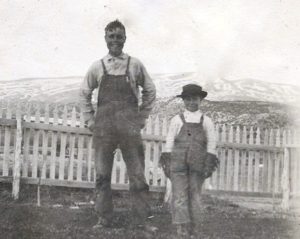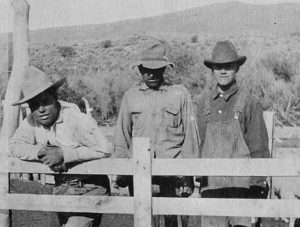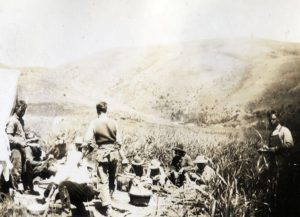
1917 – Alfred and Archie Toyn
Alfred Charles Toyn was born on July 4, 1902 at Grouse Creek, Box Elder, Utah, at the home of his grandparents, David Harry and Martha Jane Davis Toyn. He was born to Charles Crawford and Ellen Kimber Toyn. The parents lived in a log cottage as did most of the settlers at that time.
There were quite a few Indians around in those days. The whites and Indians were good friends with each other. The leader of the Indian group was “Jack.” He soon acquired the name of “Grouse Creek Jack.” His wife was named “Phoebe.” There were several young folks in the group who associated with the white children and they became close friends. One Indian squaw had lost her baby at birth. When Alfred was born, she begged Ellen to give her Alfred.
As Alfred grew older, he enjoyed playing sports with the other children, both white and Indian, and they became close friends. They played sports, such as ball games, horse back riding and marbles.
Alfred was very quiet, not having a lot to say. He had a lot of talents which very few people knew about. He developed a love for music and learned to play the guitar. He also had a good singing voice. One time at Grouse Creek he took the part of an Indian Chief in a local play. He rented his costume from a Salt Lake Costume Co. and he looked so handsome. He sang a solo, “Big Chief loved his Indian Maiden, and his heart is sad.”

1919 – Alfred Toyn, Winfred Kimber and Neil Burton
He attended school in Grouse Creek. He later was employed, doing several different types of work. He was interested in mining, herded sheep for Carsons, also worked for Miller and Lux, cow punching, for some time. He and a cousin, Ray Cooke, thought working in California sounded good, so decided to try it. It wasn’t as much fun as they thought it would be, so they came home.
He worked for Elmer Kimber some of the Summers when Elmer contracted haying jobs for the Utah Construction Co. at the H.D. ranch in Nevada. He stacked and ran a buck-rake. He also worked around the shearing corrals, jamming wool part of the time.
He was introduced to his future wife by his sister Cora. He fell in love with Josephine Rhea Newton. They were married on September 27, 1923 in Ogden, Weber County, Utah. Neither of their parents knew of the marriage until it was complete. They purchased a home and a forty-acre farm in Grouse Creek.
After he was married, he spent quite a bit of time in Oregon and there he worked in the timber and sawmill.
Alfred went to work for the Southern Pacific Railroad. He worked as a pumper, a person who supplied water to the locomotives. He was transferred occasionally and they lived in several small towns – Carlin, Elburz, Loray and Lucin.
He also worked in a rock quarry near Lucin, Utah. He and five young men contracted to dig what were called “coyote holes” in Lucin, Utah. These were tunnels just high enough to work in while kneeling down. When the tunnel was a certain length, a large charge of dynamite was placed. When the dynamite was set off, it would blow a large portion of the hill loose. The dirt and gravel from the hill was then hauled away and used as “ballast” for building and repairing the railroad bed. This was a very dangerous job, especially health wise. All five of these men contracted silicosis or Miner’s Consumption, caused from breathing the dust and impurities while working in these tunnels. His condition worsened and he spent six months in the Southern Pacific Hospital in San Francisco,California.
Alfred died at the hospital on May 15, 1945, and was buried in Tremonton, Utah, leaving his wife Rhea and their two sons, Edward LaMar and Charles Clay. His son Verl was killed the previous year during World War II in France. His daughter, Lenora, died at age three from spinal meningitis. Both are buried in Tremonton, Utah.
LaMar retired as an Air Force Navigator. Charles retired as a Jet Mechanic.

1921 Cow Outfit – Alfred Toyn on the right.
